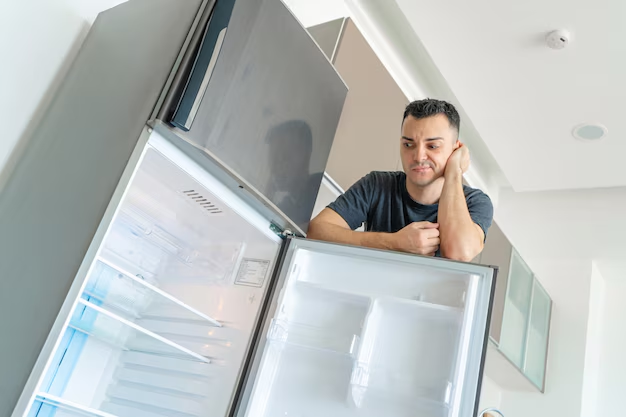Understanding the Sounds of Your Refrigerator: Why Does It Pop?
Opening your refrigerator to grab a snack, you might have noticed those unusual popping sounds coming from it. While it might initially be alarming or puzzling, rest assured that these noises are often perfectly normal. But what exactly causes these persistent pops? This article aims to dive deep into this common household wonder, exploring the mechanics, reasons, and solutions connected to the popping sounds in refrigerators.
The Source: Why Does Your Refrigerator Make Popping Noises?
Refrigerators, despite their everyday presence, are complex machines. The sounds they make result from various components working to keep your food fresh. Let’s take a closer look at why these sounds occur.
The Expansion and Contraction of Materials
Thermal Expansion: One primary cause of popping noises in refrigerators is thermal expansion and contraction. These sounds typically occur when the temperature of materials changes. In a refrigerator, parts like the evaporator coils or plastic interiors contract and expand when cooling cycles start or stop, producing audible pops.
Expansion of Refrigerant: The refrigerant circulating through your appliance also causes changes in pressure that can lead to similar sounds. As the gas moves and expands, it presses against the coils, sometimes resulting in what you hear as popping.
Defrost Cycle Activity
Regular Defrost Cycles: Most modern refrigerators employ an automatic defrost function. During this cycle, heating elements turn on to melt any frost accumulation on the evaporator coils. This sudden change in temperature can cause noises similar to popping.
Ice Maker Operations
Ice Create and Drop Sounds: If your refrigerator includes an ice maker, the machine makes several sounds while creating and dropping ice into the storage bin. These sounds often mimic popping and are part of its normal operations.
Can Popping Noises Indicate Issues?
While most popping noises are entirely normal, it’s also possible for them to signal a potential issue. Here’s how you can determine if there’s a problem.
Assessing Noise Frequency and Intensity
Significant Changes in Patterns: If the popping sounds suddenly become more frequent, louder, or occur alongside other unusual noises like hissing, buzzing, or rattling, these could indicate something is amiss. It might be wise to monitor for patterns over a few days.
Observing Performance and Temperature: Keep an eye on your refrigerator's performance. Are the temperatures steady? If you notice a decrease in cooling efficiency, along with persistent or loud pops, consider seeking professional advice.
Additional Signs to Watch For
- Increased Energy Bills: A sudden hike in energy consumption might result from a poorly functioning component causing the noise.
- Food Spoilage: If food spoils faster than usual, this might relate to temperature discrepancies connected to the noises.
Simple Ways to Minimize Noise
You don’t always have to keep tolerating these popping sounds. In many cases, simple adjustments can mitigate the noise levels.
Adjusting the Temperature Settings
Ensure Proper Temperature Levels: Make sure your freezer is set to the manufacturer's recommended settings, usually between 0°F (-18°C) for the freezer and 37°F (3°C) for the refrigerator compartment. Proper settings can minimize temperature variations and reduce the potential for expansion-based noises.
Level and Position Your Refrigerator
Balance the Fridge: Uneven floors or incorrectly positioned refrigerators might amplify certain sounds. Utilize a level tool to ensure your appliance sits evenly, which can often help reduce noise.
Increase Air Flow
Avoid Overpacking: Overstuffed refrigerators might cause cooling inefficiencies, prompting more frequent cooling cycles and additional noises. Leave space between items to encourage proper air circulation.
When to Call a Professional
Understanding when a noise is more than just an inconvenience is crucial. Let’s discuss situations where a professional inspection might be beneficial.
Continuous Unusual Noises
Persistent Loud Popping: If the popping sound persists despite making adjustments or is accompanied by other unsettling noises, it might be time for a more thorough check.
Noticeable Performance Issues
Fluctuating Temperatures: Have you noticed the fresh food compartment isn’t as cool as it should be? Fluctuating temperatures can often imply compressor or cooling system issues causing excessive noise.
Visual Inspection of System
Examine Seals and Coils: Look for any visible signs of wear or damage. Loose internal components, cracked seals, or exposed coils may cause noise and require professional attention.
Quick Reference: Handling Refrigerator Popping Sounds
Here’s a quick summary to help you navigate these sounds:
- 👂 Listen for Patterns: Noise changes in frequency and volume can indicate issues.
- 🔧 Adjust Temperature: Ensuring proper settings can prevent excessive popping.
- 📏 Level the Appliance: Ensure the refrigerator is evenly positioned.
- 🚪 Keep Space: Allow air circulation for efficient cooling.
- 💡 Professional Help: Seek advice if noise persists with performance changes.
Conclusion: Embrace Common Sounds
In the symphony of household sounds, your refrigerator’s pops are often nothing to be worried about. By understanding the underlying mechanics and knowing how to respond if something seems amiss, you can rest easy knowing that these noises are a part of your fridge performing its cooling duties. However, don’t hesitate to reach out for expert help whenever you are unsure. Balancing awareness with practical knowledge ensures that you enjoy both peace of mind and a well-functioning appliance.

